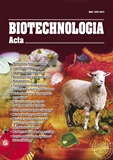ISSN 2410-7751 (Print)
ISSN 2410-776X (Online)

Biotechnologia Acta Т. 16, No. 6 , 2022
P. , Bibliography 26, Engl.
UDC:
https://doi.org/
Full text: (PDF, in English)
MOLECULAR IDENTIFICATION AND ANTIBACTERIAL ACTIVITY OF MACROFUNGUS Trametes sanguine (L.)
Sukumar Dandapat1, Manoj Kumar2, Rohit Srivastava1, Manoranjan Prasad Sinha1
1 Department of Zoology, Ranchi University, Jharkhand, India
2 Department of Zoology, St. Xavier’s College, Ranchi, Jharkhand, India
Aim. The molecular identification of Pycnoporus sanguies, a previously morphologically mushroom, was done to see the antibacterial activity against pathogenic bacteria Staphylococcus aureus and Salmonella typhi.
Methods. A fragment of the D2 region of 28S rDNA was amplified by PCR, sequenced, and BLAST was performed using the consensus sequence. The maximum identity score was used to build a phylogenetic tree. Agar well diffusion was used to study the antibacterial activity.
Results. Sequencing of a 700 base pair PCR amplicon was carried and a 616 base pair of D2 region of large subunit gene was generated. The 100 blast hits on the D2 region of LSU gene showed similarity to Trametes sanguinea voucher PRSC95 (GenBank Accession Number: JN164795.1) based on nucleotide homology and phylogenetic analysis. Antibacterial screening revealed that Staphylococcus aureus had higher activity, with a 3 mm to 13 mm zone of inhibition and a 100 g minimum inhibitory concentration, than Salmonella typhi, which had a 5 mm to 15 mm zone of inhibition and a 200 g minimum inhibitory concentration.
Conclusion. According to the obtained result, the morphologically identified mushroom Pycnoporus sanguies can be referred to as Trametes sanguine, and it can be antibacterial agents.
Key words: macrofungi. Tramates, PCR, phylogenetic analysis, antimicrobial activity
© Palladin Institute of Biochemistry of National Academy of Sciences of Ukraine, 2023

